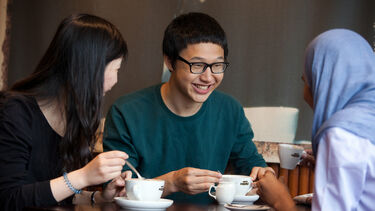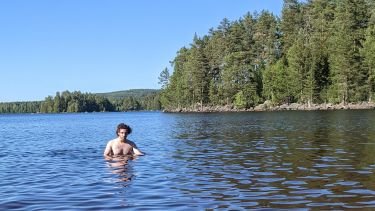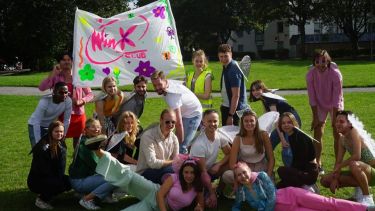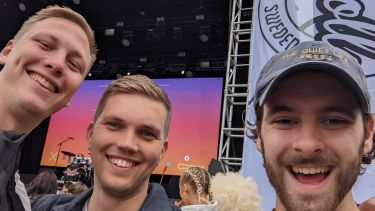One of the best years of my life

Why did you choose to study abroad in Sweden?
First, I fell deeply and irreversibly in love with the country and its people during my stay there, and so I regard my time abroad with a lot of rose-tinted bias. Second, through a combination of luck and determination to socialise, I was able to engage with Sweden in a way that seemed to go beyond the regular experience of internationals – some of my international friends from this year had markedly fewer stars in their eyes about Sweden than I do. Third, I chose to study abroad in the first place in part to retreat from the UK in a kind of reverse logic; in the preliminary stages of the planning process it was, at times, less about the destination and more about escaping the point of departure. This was during the height of the COVID-19 pandemic and I was dealing with bereavement (mostly unrelated), two large storm clouds looming over me that I was desperate to evade by fleeing to a figuratively sunnier place.
How did you come to study at Uppsala University?
Uppsala University was not my first choice, and the last of the above caveats is to thank for bending fate in such a way that I had, unexpectedly, one of the best years of my life. I was originally bound for Christchurch in New Zealand which is about as sunny and as far from home as is possible. However, the pandemic saw New Zealand bring the portcullis down on entrants to the country. The University of Christchurch cancelled all of their study abroad agreements. I was very fortunate that, while destinations outside Europe had been allocated already at the university-level, there were still locations within Europe at the department level. I quickly redrafted my application and, working with my department’s study abroad advisor, was able to secure a place at Uppsala University in Sweden.
How prepared for the move were you?
It was still mythical to me at that point, a land of Vikings and tall blonde demigods and wolves all cohabiting wealthily in its boundless, socialist forests. This turned out to be half-true. My main takeaway from my pre-departure phase is just how clueless I was. As it turned out, I learned quickly and Sweden is an incredibly forgiving and easy country to get used to. But it may not have been so! My warning to prospective students is to go online and brush up on the knowledge imparted by expats and previous international visitors to your host country.
Did you join in on any extracurricular activities?
One of the reasons why I landed softly from this tumble into the unknown when I probably shouldn’t have, is that the student body at Uppsala is more engaged than any other I’ve seen or heard of. Not only are they academically driven, but their student societies transcend and reach beyond the classroom and extra-curricular into something of a lifestyle. The larger ones have hundreds of active members across all years of study. I study Politics and International Relations, and during my time in Sweden was active within UPS (the student society for politics), as well as UPaD (the society for peace and development studies). There is a committee for almost everything: sports, culture, events, education, equality, finance, and so on. UPS had an international committee, Interpol, which comprised of four Swedish students when I arrived in Sweden and grew to six students by the time I left – myself included. You would have to be impressively disinterested to avoid coming to even one event or activity organised by your society.
What were the people like in Sweden?
My very first experience with Swedish students came the morning after I arrived, when I was launched into UPS’s Inspark (Swedish freshers). It was one full week of student-run bonding activity which I made sure to attend and be outgoing at every day. This was my foot-in-the-door for making the most formative memories during my year abroad and the enduring piece of wisdom I gained about the whole process: your experience is no more or less than what you make of it. Almost everyone in Sweden speaks fluent English and enjoys showing off their grasp of the language to native speakers. The togetherness imbued into Scandinavian culture also means people are eager to help. I once had to have a friend talk me through the process of picking up a parcel from the post office, for example. I encourage prospective students to make friends with the locals, to ask lots of questions, and (most importantly) to say yes as often as possible. This was my recurring motto throughout the year and it led me to some seriously unique places.
What sort of things did you study, how was this different to Sheffield?
After the Inspark came the studies, although they were punctuated by a nearly ludicrous number of formal dinners (gasques), social activities, workshops and other events. During my time abroad I studied peace and conflict, a course taught primarily to domestic students but conducted fully in English. I chose this course due to Uppsala’s reputation as the focal point for conflict research in Europe, being the home of the UCDP (Uppsala Conflict Database Program) and boasting a faculty full of seminal academics within that field. The two key ways these studies differed from what I’m used to were an emphasis on practice over theory and a somewhat more nurturant, less rigorous style of teaching and examination. I do not think the British or Swedish style of university teaching is necessarily better than the other. Instead, for me, they complemented each other well. At times the course did feel constrained and a little hand-holding in its scope, but I recognise that the level of freedom we Politics students at Sheffield get in terms of academic interest can be unusual elsewhere.
What did you get up to in your free time?
Outside of school hours is where the real education involved in studying abroad lies. In addition to the aforementioned formal dinners and among myriad other things, I: acquired basic Swedish through immersion and self-teaching, went skiing for the first time in the north of the country, learned traditional drinking songs, cooked and ate traditional Swedish food (especially korvstroganoff), explored every corner of Stockholm, bought a bike from the 1960s that I used every day, attended countless hikes and barbeques (Swedes love to grill), saw a wild moose, swam in lakes and rivers, sweated in saunas, and learned to love the art and music of Scandinavians past and present.
I think one of the experiences I had very late in the year, with only a few weeks left in Sweden before my return to the UK, best encapsulates the magic available to those of us looking for it in going abroad. I was invited by three of my Swedish friends to a music festival 8 hours(!) north of Uppsala. At around 5am, we bundled ourselves, our bags and a tent into my friend’s tiny car and set off. That weekend was a weekend of sleepless breathlessness, camping by the lake and playing discgolf in the mornings before heading into town to sing and dance for hours to Sweden’s biggest rising stars; only to return to the campsite at 4am and repeat. The sun never set while we were there. How vivid, I thought, as I sang along to Veronica Maggio’s Jag Kommer with my newfound close friends and ten thousand others, ecstatic and electric under a midnight sun.
I could not recommend studying abroad highly enough. As well as the chance to learn under an entirely different academic approach and bolster your profile with some unusual and prestigious university experience, studying in another country opens the door to a process of personal development more rapid and more encompassing than possibly any you will have undertaken up to this point in your life.
In order to ride that wave, however, you need to work for it. Studying abroad is about new experiences and the unknown; it is supposed to induce a bit of vertigo. The best way down from that ledge, in my opinion, is to close your eyes and step off.

International undergraduate scholarships
We offer a generous package of financial support for international undergraduate students, including scholarships worth £10,000 towards the annual tuition fee (worth up to £40,000 for four-year programmes).
Applications are open for existing offer holders for an undergraduate degree programme starting in autumn 2025.



